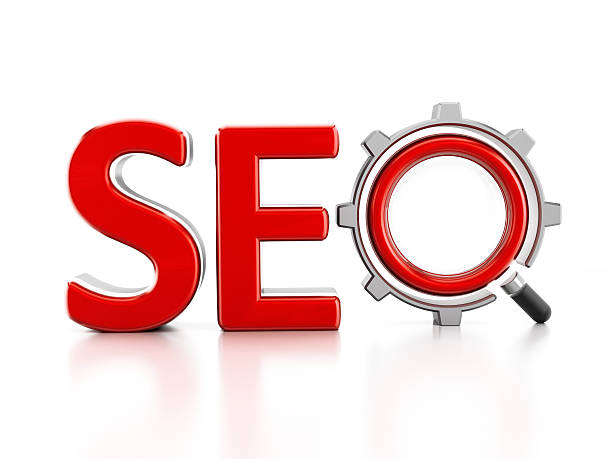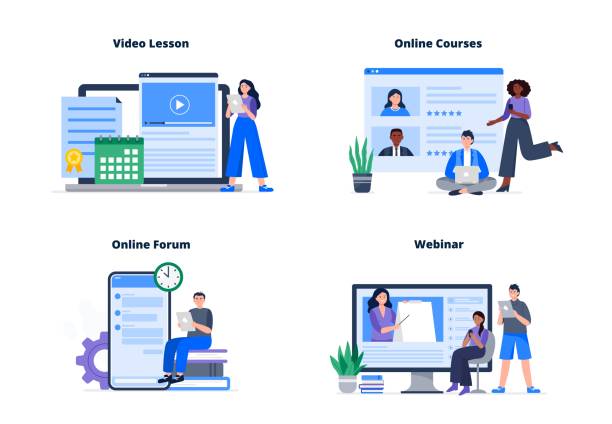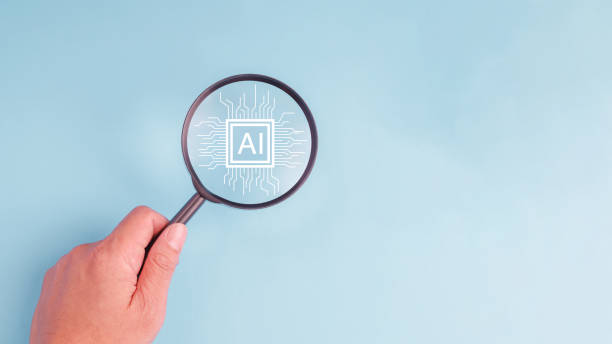An Introduction to Off-Page SEO and Its Importance

In today’s competitive web world, #Search_Engine_Optimization or #SEO is no longer an option, but a vital necessity for your website’s visibility.
While #On-page_SEO focuses on improving elements within your website, #Off-page_SEO or off-site optimization, refers to activities performed outside your website, aiming to increase its authority and ranking in search results.
This area plays an equally, if not more, significant role in the success of a comprehensive SEO strategy compared to on-page SEO.
Understanding and correctly implementing Off-Page SEO techniques can significantly boost your organic traffic and transform your website into an authoritative reference in your field.
This section provides an explanation for understanding the fundamentals.
Tired of losing customers due to poor e-commerce website design? With Rasaweb, solve this problem forever!
✅ Increase sales and visitor-to-customer conversion rates
✅ Smooth and engaging user experience for your customers⚡ Get free consultation
The Difference Between Off-Page SEO and On-Page SEO: An Analytical Look

To fully understand the concept of Off-Page SEO, it is essential to first recognize its difference from On-Page SEO.
On-Page SEO refers to all actions you take within your website to improve its ranking; including keyword optimization, URL structure, page loading speed, user experience (UX), quality content, and meta tags.
However, Off-Page SEO operates beyond the boundaries of your website.
This includes backlink building (or link building), social media activity, content promotion on other platforms, and any action that signals to search engines that your website is authoritative and trustworthy.
This is a deep analysis of the boundaries of SEO activities.
These two components are interdependent, and success in one is not possible without the other.
A website with excellent content but without strong backlinks is like a great book that no one sees.
Backlink Building: The Heart of Off-Page SEO and Its Types

Undoubtedly, backlink building (or external link building) is the backbone of Off-Page SEO.
A backlink is a link that points from another website to your website.
Search engines consider these links as a “vote of confidence” or “referral” from other websites.
The higher the number and quality of incoming backlinks to your site, the more your Domain Authority increases with Google, leading to a higher ranking.
This section is a comprehensive tutorial.
Backlinks come in various types, each with its own characteristics:
| Backlink Type | Description | SEO Impact |
|---|---|---|
| DoFollow | Links that transfer SEO “authority” or “power” from the source site to the destination site. | Very Positive |
| NoFollow | Links that tell search engines not to transfer SEO authority. (e.g., blog comments) |
Indirect (Traffic, Branding) |
| UGC (User Generated Content) | Content generated by users, usually includes the rel=”ugc” tag. | Indirect/Neutral |
| Sponsored | Paid or advertising links that should be marked with the rel=”sponsored” tag. | Negative if not tagged |
The goal of an Off-Page SEO strategy is to acquire high-quality DoFollow backlinks from reputable websites relevant to your field.
This specialized approach requires time and a clear strategy.
Criteria for a Quality Backlink: Practical Guidelines

Not all backlinks are created equal.
A backlink from a reputable and high-traffic website can have a much greater impact than several backlinks from low-quality and spammy websites.
For success in Off-Page SEO, you must seek quality backlinks.
The main criteria for a quality backlink include: the Domain Authority and Page Authority of the linking site, the thematic relevance between the two websites, the placement of the link on the page (for example, a link within the main content text has more value than a link in the footer), and the use of appropriate anchor text.
Anchor text is the visible, clickable text in a hyperlink and should be relevant to the destination page.
This section provides important guidelines for choosing backlinks.
Also, avoid unnatural and artificial backlinks.
Google’s algorithms are smart and can identify spammy or purchased links, potentially penalizing your site.
Therefore, for your Off-Page SEO strategy, prioritize quality over quantity.
Research shows that 80% of customers trust companies with professional websites more. Does your current website inspire this trust?
With Rasaweb’s corporate website design services, solve the problem of customer distrust and a weak online image forever!
✅ Create a professional image and increase customer trust
✅ Attract more sales leads and grow your business
⚡ Get free consultation now!
White Hat and Black Hat Link Building Methods: A Comprehensive Explanation

In the world of Off-Page SEO, there are two main approaches to link building: white hat and black hat methods.
White hat methods include ethical and Google-approved techniques that add real value to your site.
These methods include creating excellent and shareable content, publishing guest posts on reputable websites, collaborating with influencers, participating in relevant online forums, and building strong public relations.
The goal of these methods is to naturally attract backlinks by creating value.
In contrast, black hat methods refer to techniques that attempt to quickly gain rankings by manipulating Google’s algorithms, but are very risky in the long term.
This includes buying backlinks, using PBNs (Private Blog Networks), spamming comment sections, and automated link building.
Google strongly combats these methods, and websites that use them may face severe penalties or even complete removal from search results.
In this comprehensive explanation, we emphasize always using white hat methods for your Off-Page SEO to ensure the stability and security of your website.
The Role of Social Signals in Off-Page SEO: A Deep Analysis

While backlinks are the primary component of Off-Page SEO, social signals also play a crucial role in an off-page SEO strategy.
Social signals include shares, likes, comments, and the level of user engagement with your content on social media platforms such as Instagram, Twitter, LinkedIn, and Facebook.
Although Google has not directly stated that social signals are a direct ranking factor, they can indirectly influence SEO.
For example, content that is heavily shared on social networks drives more traffic to your website, and increased visibility can lead to natural backlink acquisition.
Furthermore, strong social media activity helps increase brand awareness and your online reputation.
This is an important analysis of the potential of social media in Off-Page SEO.
Therefore, you should not underestimate the power of social networks in your off-site optimization strategy.
This is an important analytical component that directly impacts your brand’s credibility.
Review of Off-Page SEO Tools and Competitor Analysis: Expert Guidance

For success in Off-Page SEO, using appropriate tools and competitor analysis is essential.
These tools help you examine your backlink profile and that of your competitors, identify new link-building opportunities, and implement more effective strategies.
Competitor analysis in Off-Page SEO allows you to see where your competitors are getting backlinks from, what type of content attracts links for them, and what their strengths and weaknesses are in this area.
With this information, you can create a more precise plan for yourself.
This section provides expert guidance on important tools.
| Tool Name | Main Use | Outstanding Feature |
|---|---|---|
| Ahrefs | Backlink analysis, keyword research, competitor analysis | Most comprehensive backlink database |
| Semrush | SEO analysis, PPC, content, social media | All-in-one digital marketing tool |
| Moz Pro | Domain Authority (DA/PA), backlink checking, rank tracking | Highly authoritative DA and PA metrics |
| Google Search Console | Search performance, site issues, incoming backlinks | Direct and free data from Google |
By using these tools, you can optimize your Off-Page SEO strategies and measure your performance against competitors.
This analytical approach is key to sustainable success.
Penguin and Google’s Penalties in Off-Page SEO: Important News

One of the most significant developments in the world of Off-Page SEO was the introduction of Google’s Penguin algorithm.
Introduced in 2012, this algorithm was designed to combat spammy link building and manipulation of search results.
Before Penguin, many webmasters tried to improve their rankings using black hat techniques such as buying bulk backlinks or link building from low-quality sites.
Penguin imposed severe penalties on websites that used these illicit methods, which could lead to a sharp drop in rankings or even complete removal from search results.
This was important news for the SEO community.
Currently, Penguin has become part of Google’s core algorithm and operates in real-time, meaning penalties are applied immediately.
This emphasizes the importance of focusing on white hat Off-Page SEO and generating natural, high-quality backlinks.
Therefore, always adhere to ethical practices to stay safe from Google’s penalties.
This is an explanation for understanding the risks of improper link building.
Does your current website convert visitors into customers or drive them away? With professional corporate website design by Rasaweb, solve this problem forever!
✅ Build credibility and powerful branding
✅ Attract target customers and increase sales
⚡ Get free consultation now!
Content Strategy for Off-Site SEO: Expert Guidance

At first glance, Off-Page SEO and content might seem unrelated, but in reality, quality content is the cornerstone of a successful off-site SEO strategy.
If your content is valuable, informative, engaging, and unique, other websites and users will naturally be inclined to link to it.
This is what is known as organic link building.
Creating specialized and in-depth content, case studies, infographics, videos, and research reports can help you become recognized as an authority in your field.
This section provides expert guidance for content creation.
Furthermore, thought-provoking or controversial content that sparks discussion and engagement can have high potential for attracting links and shares.
Then, by promoting this content on social media, through email marketing, and by outreach to relevant websites, you can increase your chances of getting backlinks.
Remember that the more value your content provides, the less effort you’ll need to attract external links, and this directly impacts your Off-Page SEO success.
The Future of Off-Page SEO and Upcoming Challenges: Thought-Provoking Content

The future of Off-Page SEO is full of new challenges and opportunities.
With Google’s algorithms becoming smarter and the advancement of artificial intelligence, identifying spammy and unnatural links has become easier.
This means that off-page SEO will increasingly move towards white hat strategies and the creation of valuable content.
Will backlinks remain the most important ranking factor in the future? This is a thought-provoking question that many SEO professionals are debating.
Brand authority, user experience, and user behavioral signals will likely gain more importance.
Also, voice search, image search, and augmented reality can add new dimensions to Off-Page SEO.
The main challenge for Off-Page SEO specialists will be how to adapt to these changes and develop strategies that are sustainable and effective in the long term.
Can top rankings be achieved by completely eliminating links? This is a question the future will answer, but for now, quality backlinks remain the king of Off-Page SEO.
This is an analysis of future trends.
Frequently Asked Questions
| Row | Question | Answer |
|---|---|---|
| 1 | What is Off-Page SEO? | Off-page SEO refers to a set of actions performed outside your website to improve its ranking in search engines. These actions include backlink building, social media presence, branding, and so on. |
| 2 | Why is Off-Page SEO highly important? | Off-page SEO indicates to search engines that your website is authoritative, popular, and trustworthy. High-quality backlinks from reputable sites are strong signals for better ranking and help increase your domain authority. |
| 3 | What are the most important components of Off-Page SEO? | The most important components of Off-Page SEO include: Link Building, Content Marketing, Social Media Marketing, Influencer Marketing, and Online Reputation Management. |
| 4 | What is a backlink and why is it important for Off-Page SEO? | A backlink is a link that points from one website to your website. These links act as a “vote of confidence” from Google’s perspective and indicate the credibility of your content. The higher the number and quality of backlinks, the better your site’s ranking will be. |
| 5 | What are the types of backlinks in terms of SEO impact? | The two main types of backlinks are DoFollow and NoFollow. DoFollow backlinks pass authority (Link Juice) and directly impact ranking. NoFollows do not pass authority but can still generate traffic and help make the link profile appear natural. (Also UGC and Sponsored) |
| 6 | How can I create high-quality backlinks for my site? | To build high-quality backlinks, you can use methods such as: creating excellent and shareable content, Guest Posting on relevant and reputable sites, Broken Link Building, Digital PR, and analyzing competitor backlinks. |
| 7 | What are Toxic Backlinks and how do they affect a site? | Toxic or spam backlinks are links that point to your site from low-quality, spammy, or irrelevant websites. These backlinks can harm your site’s ranking and even lead to penalties by Google’s algorithms. |
| 8 | What is the role of social media in Off-Page SEO? | Although social signals (likes, shares, etc.) are not direct ranking factors, they contribute to Off-Page SEO. They increase content visibility, drive direct traffic to the site, and ultimately boost the chances of acquiring natural backlinks and improving brand recognition. |
| 9 | What is the importance of diversity in a backlink profile? | Diversity in a backlink profile means that your links come from various sources (blogs, forums, news sites, directories), with diverse anchor texts, and with a mix of DoFollow and NoFollow links. This diversity signals to Google that your link building is natural and organic. |
| 10 | What are common mistakes in Off-Page SEO that should be avoided? | Common mistakes include: buying a high volume of backlinks from low-quality sources, over-optimizing link building with target keywords, neglecting quality in favor of quantity in backlink building, lack of diversity in the link profile, and ignoring toxic backlinks and failing to disavow them. |
And other services of Rasaweb Advertising Agency in the field of advertising
Smart Marketing Automation: A novel service to improve SEO ranking by optimizing key pages.
Smart Digital Advertising: A fast and efficient solution for analyzing customer behavior with a focus on attractive UI design.
Smart Sales Automation: An effective tool to increase sales by customizing the user experience.
Smart Link Building: An effective tool to increase sales by optimizing key pages.
Smart Website Development: A professional solution for online growth with a focus on SEO-driven content strategy.
And over hundreds of other services in the field of internet advertising, advertising consultation, and organizational solutions
Internet Advertising | Advertising Strategy | Advertorials
Resources
- What is Off-Page SEO? Everything about off-page SEO
- What is Off-Page SEO and what is its application?
- Off-Page SEO | What is Off-Page SEO and how to do it?
- What is Off-Page SEO and how does it help site growth?
? For a big leap in your business and reaching the pinnacle of success, Rasaweb Afarin Digital Marketing Agency is by your side with its specialized services. Get a powerful online presence right now with fast and professional website design.
📍 Tehran, Mirdamad Street, next to Bank Markazi, Southern Kazeroon Alley, Ramin Alley, No. 6



